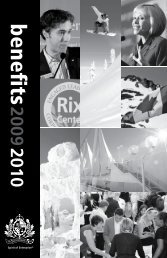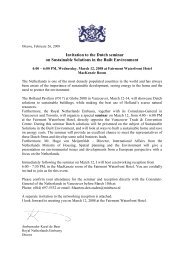Distinguished Speaker - Vancouver Board of Trade
Distinguished Speaker - Vancouver Board of Trade
Distinguished Speaker - Vancouver Board of Trade
Create successful ePaper yourself
Turn your PDF publications into a flip-book with our unique Google optimized e-Paper software.
Sustainable practices make good business sense,<br />
engage staff and donors: YWCA CEO Janet Austin<br />
By Nancy Tinari<br />
Business and organizations are becoming<br />
increasingly aware <strong>of</strong> climate change and the<br />
need to do their part to reduce their carbon<br />
footprint. But the YWCA is a leading model<br />
<strong>of</strong> how a non-pr<strong>of</strong>it organization has established<br />
environmentally sound practices as a<br />
core value. This is reflected in many practical<br />
initiatives, some involving major building<br />
projects, as well as day-to-day operations<br />
and purchasing decisions.<br />
During a recent interview for Sounding<br />
<strong>Board</strong>, YWCA CEO Janet Austin shared insights<br />
on how the organization turned green.<br />
When asked what motivated the YWCA<br />
to start making changes, Austin explains<br />
she has a strong personal interest in the<br />
environment. A house she and her husband<br />
built about nine years ago won the Mayor’s<br />
Environmental Award, and it encouraged her<br />
to start developing sustainable initiatives at<br />
the YWCA in 2005.<br />
However, it wasn’t until 2007 that the<br />
organization formally set specific targets<br />
towards reducing its carbon footprint. This<br />
was in large part due to a social marketing<br />
event promoted by the City <strong>of</strong> <strong>Vancouver</strong>,<br />
called One Day, when all organizations and<br />
individuals were encouraged to make small<br />
changes in their practices that would have a<br />
positive effect on the environment.<br />
Austin says, “We agreed to participate<br />
. . . I think that really was the starting point.”<br />
At the same time, the YWCA benefited by<br />
hiring Ted Cathcart as its facilities manager.<br />
Cathcart had many ideas about sustainability,<br />
including a plan to convert the ro<strong>of</strong>top<br />
ornamental garden at the Hornby Program<br />
Centre into a produce garden.<br />
Austin gave him the go-ahead, with the<br />
only caveat being he “couldn’t spend a penny<br />
more” on the garden’s upkeep. Many volunteers,<br />
under the guidance <strong>of</strong> master gardeners<br />
from UBC, now work in the garden. Last<br />
Janet Austin stands in the ro<strong>of</strong> top produce garden at the Hornby Program Centre<br />
“It is possible for a non-pr<strong>of</strong>it organization<br />
whose core focus is community service work<br />
to . . . maintain our programs and services<br />
in a way that adheres to sound principles <strong>of</strong><br />
environmental sustainability,” Janet Austin<br />
BC Hydro Power Smart Tips<br />
for your business<br />
Being green is <strong>of</strong> top priority nowadays and BC Hydro has compiled<br />
a list <strong>of</strong> quick tips to help you and your family conserve energy and<br />
reduce your impact on the environment.<br />
year it yielded half a tonne <strong>of</strong> produce that<br />
was donated to the YWCA’s Crabtree Corners<br />
Community Kitchen, serving families in the<br />
Downtown Eastside, Austin says.<br />
Cathcart and Lori Brown, the YWCA’s<br />
corporate development and purchasing<br />
manager, started the YWCA’s formal commitment<br />
to sustainability by attending<br />
training sessions taught by Climate Smart<br />
Businesses Inc. The company specializes<br />
in helping businesses measure their annual<br />
CO 2<br />
e (carbon dioxide equivalent, the universal<br />
unit used to report greenhouse gas emissions)<br />
and in advising them on strategies to<br />
reduce it. A grant from Vancity paid for the<br />
training program.<br />
According to Austin, Cathcart and Brown<br />
found the Climate Smart training helpful.<br />
Business people can rest assured that one<br />
doesn’t need to have a scientific background<br />
to use the s<strong>of</strong>tware that Climate Smart provides<br />
for measuring CO 2<br />
e.<br />
After completing the Climate Smart training<br />
in 2007, the YWCA set a goal to reduce<br />
its annual CO 2<br />
e by 25 per cent by 2013. Impressively,<br />
they have already measured an<br />
18-per-cent reduction, reports Austin. This<br />
has been achieved in numerous ways, both<br />
large and small:<br />
At the YWCA’s 155-room hotel, $500,000<br />
spent on capital improvements led to a CO 2<br />
e<br />
reduction <strong>of</strong> 76 per cent, largely following<br />
the installation <strong>of</strong> a high-efficiency boiler.<br />
Energy-efficient mini fridges and lowering<br />
the temperature <strong>of</strong> the water heaters also<br />
PHOTO BY N. Tinari<br />
helped. The result is capital costs will be<br />
recovered in five years through reduced<br />
operating costs.<br />
The YWCA’s new housing projects in<br />
Surrey and Coquitlam are being built to Gold<br />
LEED certification standards. Cost-benefit<br />
analyses <strong>of</strong> retro-fitting some <strong>of</strong> the YWCA’s<br />
older buildings to make them more energyefficient<br />
are currently underway.<br />
Procedures followed at all 30 Metro <strong>Vancouver</strong><br />
YWCA locations include composting,<br />
recycling (staff are taught how to do this<br />
effectively), purchasing green stationery<br />
and cleaning products and printing doublesided.<br />
Waste-reduction audits are being done<br />
at the hotel, program centre and Crabtree<br />
Corners, with an ultimate goal <strong>of</strong> producing<br />
zero waste.<br />
Austin said the benefits <strong>of</strong> sustainable<br />
practices go beyond long-term financial<br />
savings. Staff engagement is very important.<br />
All employees are encouraged to use sustainable<br />
practices at work and at home. Each<br />
employee is required to state two changes<br />
they have made at home.<br />
Staff response has been extremely positive,<br />
Austin says.<br />
“When we survey them, we see how<br />
proud they are to be part <strong>of</strong> an organization<br />
that has made a serious commitment and<br />
has taken serious steps.”<br />
Donors, too, are impressed and feel good<br />
about supporting an organization they see as<br />
environmentally progressive.<br />
“It is possible for a non-pr<strong>of</strong>it organization<br />
whose core focus is community service<br />
work to also . . . maintain our programs<br />
and services in a way that adheres to sound<br />
principles <strong>of</strong> environmental sustainability,”<br />
Austin says. “It’s the right thing to do, but<br />
we’re also demonstrating that it makes very<br />
good business sense.”<br />
Austin commented that sustainability is<br />
<strong>of</strong> concern to young people too. This year<br />
the YWCA has partnered with the YMCA<br />
for the first time in a Youth Eco Internship<br />
Program (YEIP) funded by the Canadian<br />
government’s Economic Action Plan. Under<br />
this program, 300 young people have opportunities<br />
during three-, six- or nine-month<br />
placements to gain workplace experience<br />
leading to careers in environmental sustainability.<br />
The YWCA <strong>Vancouver</strong> has been asked<br />
to take a leadership role in this program,<br />
Austin says with pride.<br />
1. Get an energy audit and follow through with improvements.<br />
2. Draft pro<strong>of</strong> your home.<br />
3. Turn it <strong>of</strong>f.<br />
4. Switch to energy-efficient lighting.<br />
5. Install automatic lighting controls.<br />
6. Buy green electronics.<br />
7. Put a freeze on inefficient refrigeration.<br />
8. Use less energy to wash your laundry.<br />
9. Reuse and recycle old electronic equipment.<br />
10. Use less energy to dry your laundry.<br />
Visit http://www.bchydro.com/powersmart/<br />
JAL recognized<br />
as an Eco-First<br />
Company in<br />
Japan<br />
Japan Airlines (JAL) was recently recognized<br />
by the Ministry <strong>of</strong> the Environment<br />
<strong>of</strong> Japan as an Eco-First Company. The<br />
recognition was based on the airline’s commitment<br />
to the Eco-First Pledge and to the<br />
established Biodiversity Policy <strong>of</strong> the JAL<br />
Group. JAL has also been promoting the<br />
Conference <strong>of</strong> the Parties to the Convention<br />
on Biological Diversity (COP10) which took<br />
place in Nagoya, Japan, earlier this year.<br />
8 Sounding <strong>Board</strong>/November-December 2010 The <strong>Vancouver</strong> <strong>Board</strong> <strong>of</strong> <strong>Trade</strong>/Spirit <strong>of</strong> Enterprise ®








